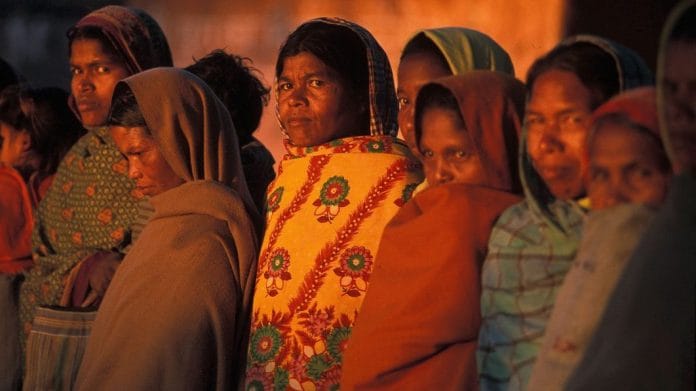New Delhi: Zero Discrimination Day is observed annually on 1 March by the United Nations and Joint United Nations Programme on HIV & AIDS (UNAIDS) to celebrate the right of everyone to live a full and productive life with dignity and equality before law and in practice. The movement seeks to promote inclusion, peace and compassion globally, ending all forms of discrimination.
This year’s theme for Zero Discrimination Day, symbolised by a butterfly, challenges the discrimination faced by women and girls in all their diversity, including women living with HIV, sex workers, discrimination based on income, race, ethnicity, disability, sexual orientation or gender identity. The UN had first celebrated Zero Discrimination Day on 1 March 2014 after UNAIDS launched its Zero Discrimination Campaign on World AIDS Day in December 2013.
Discrimination against women with HIV
UNAIDS’ Zero Discrimination spotlight on HIV-related discrimination against women and girls states that every week, around 6000 young women aged 15–24 years get infected with HIV – that is 860 per day. It further states that women living with HIV are particularly susceptible to institutional violence, stigma, discrimination and reproductive rights violations in healthcare settings.
Sabhana Patel, AIDS activist who works for the Network of Maharashtra People with HIV to discuss on discriminations faced by female HIV patients, tells ThePrint that women with HIV are far more discriminated against than men. They are often refused medical assistance especially when they go for pap smear tests. “Even though this test should be done annually to detect cervical cancer, most hospitals and doctors refuse to conduct the test in female patients living with HIV. Unless the doctor is truly committed, the patient is mostly asked not to come for the test regularly. Some hospitals do not even want to deliver babies from HIV positive women,” Patel added.
Also read: Communities have played critical role in fighting HIV. That must continue this World AIDS Day
Discriminatory laws
UNAIDS states that gender inequality in the form of women’s rights violations affects their health and well-being. “In many countries, laws that discriminate against women and girls remain in force, while laws that uphold women’s basic rights and protect them against harm and unequal treatment are far from the norm. Some of these laws limit women’s sexual and reproductive health and rights. Others criminalize people for their gender identity or sexual orientation, for selling sexual services, for using drugs or for transmitting HIV. Removing discriminatory laws is a basic building block for an equitable society”, says this year’s campaign brochure.
In India, the Transgender Person Bill 2019, which got the President’s assent on 5 December, faced massive outrage and condemnation from the transgender community, who called it an addition to the existing bigotry.
Swati Bidhan Baruah, Assam’s first transgender judge, said that until people do not emerge from the patriarchal mindset of a binary gender norm, total acceptance of transgenders is a distant dream. Baruah said that the Transgender Persons (Protection of Rights) Act in no way provides the transgender community any protection. “This is the most draconian of laws and I have already challenged it in the Supreme Court. The Act only adds to the existing discrimination and ostracism that we face. The Indian Penal Code’s quantum of punishment for rape and sexual assault is upto life imprisonment or death penalty, but punishment for sexual assault on transgenders is only six months to two years, isnt this discrimination?”, asked Baruah.
Earlier this month when the Indian government passed amendments to the existing Medical Termination of Pregnancy (MTP) Act, 1971, calling it a step towards the “safety and well-being of the women”, many women’s rights activists and civil society experts raised objections, calling it far from progressive. The new amendments allow abortion up to 24 weeks in special cases like for rape victims, ill and under-age women.
Shobha Gupta, lawyer of Bilkis Bano, who was gangraped during the 2002 Gujarat pogrom, tells ThePrint that this bill is not only discriminatory but also “mindless”. “If someone approaches a hospital for an abortion, unless there is a health risk, she cannot be denied the abortion. How can the government impose a baby on a woman? Whether single, married or widowed, giving birth is a woman’s personal choice. Period. The government cannot set up norms for it.”
The fact is that even though, every now and then, a UN body or a national, international body reminds everyone of the need for equality and justice, the discrimination faced every day by women and girls still remains deep and widespread.
Social scientist and women’s rights activist Kamla Bhasin tells ThePrint, “The tragedy is that gender discrimination starts mostly within the family and this is a global phenomena. No doubt we have made some progress against discrimination, but crimes like rape and domestic violence still remain unabated. Discrimination will end only when women have the Azadi to roam around without any fear.”
Also read: Women could be given command posts in Army if govt changes its mindset, says SC






